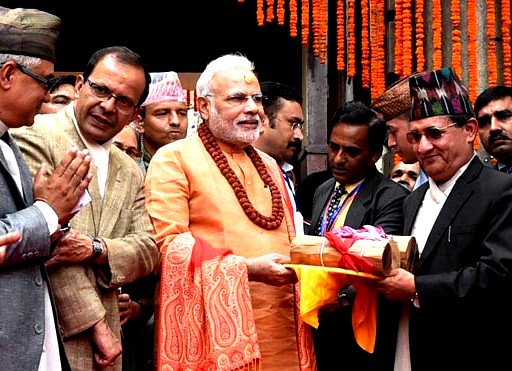By Sandeep Pandey
Nepal’s deputy PM Kamal Thapa has requested Sri Sri Ravi Shankar to convince the Indian government to lift the unofficial blockade of Nepal and end the diplomatic impasse indicating how seriously it is affecting his country.
Recently when some Indian soldiers belonging to Sashastra Seema Bal entered the Nepalese territory following some smugglers from the Kishanganj district in Bihar and several more went to retrieve them, all of them were held hostage by the Nepalese police and released only after intervention at a higher level.
Earlier, during the post-earthquake relief work the Indian media earned the wrath of Nepalese people and they were asked to leave because of the perception that India was claiming more than what it was actually doing, especially in comparison with China. Why have things come to such a pass with a country which culturally, geographically and historically should have been India’s closest ally?
When Narendra Modi became India’s Prime Minister the first country that he visited was Nepal indicating he gave much importance to Nepal compared to other bigger and powerful countries since it had majority Hindu population and possibly in the belief that Nepal would play second fiddle to India. But the reality today is that Nepalese government and people are peeved at India because of what is perceived as India’s big brother attitude towards Nepal.
There is a feeling in Nepal that Indians in general and Indian media in particular is insensitive towards the sentiments of Nepalese people. India complains about Pakistan and China occupying its territories but never talks about the Nepalese territories of Kalapani and Lipulekh, bordering China, which it continues to occupy.
It is not just Nepal, most of India’s neighbours are apprehensive about India given its size and military might. Its neighbours hold India in a view similar to what most world has about the US, a hegemonic power. India may consider itself to be a very peaceful country but clearly it has not done enough to win the confidence of its neighbours.
It is no secret that India was not happy with the Nepalese Constitution and that it communicated its feelings in those many words to Nepalese leaders even though 90% of the elected representatives of the Constituent Assembly of Nepal, entrusted with the task of drafting it, endorsed it. On the other hand China, by approving of the Nepalese Constitution, has signaled that it is ready to fill the space vacated by India, even with its cultural affinity as well as easy geographical access, as Nepal’s closest partner. An economic blockade of Nepal has been going on which has seriously hampered supplies of fuel, cooking gas, medicines and important items to the Himalayan nation. Nepal claims this blockade is inspired by India. India says it is the Madhesis who’re responsible. India’s position is untenable as India can easily overcome the Madhesi resistance if it really wanted to end the economic blockade and help Nepal. Madhesis are distinct from the hill people of Nepal and are closer to people in UP and Bihar states of India ethnically as well as in their interaction. Cross border marriages are fairly common.
India has often blamed Pakistan for interference in its internal matters whenever Pakistan raises the issue of Kashmir on any international fora. It may be argued that Kashmiri people are ethnically different from any Pakistani population and hence Pakistan has no right to speak on behalf of Kashmiris. Madhesis are closer to Indians than Kashmiris are to Pakistanis.
But what about Sri Lankan Tamils? It is a well known fact that Tamils were butchered by the Sri Lankan army in 2009. They are fighting for a separate state Tamil Eelam. The majority Sinhalese have had a strained relationship with Tamils since its independence in 1948. Over a lakh people have died in the civil war, about the same number sought refuge in India, 2 lakhs sought refuge in Canada, thousands have disappeared and close to eight lakhs are internally displaced. There have been demands from UN Human Rights Commission to institute an international enquiry in the massacres of Tamils in Sri Lanka but the successive governments have stonewalled it.
Report of the UN Secretary General’s Panel of Experts on Accountability in Sri Lanka found credible allegations of war crimes, crimes against humanity and violation of international law by the Sri Lankan military as well as Liberation Tigers of Tamil Eelam fighting for the Tamil cause. 40,000 civilians are believed to have been killed just in the final phase of civil war, mostly due to shelling by Sri Lankan army. All political parties in Tamil Nadu have supported the cause of Sri Lankan Tamils and have objected to India’s position in support of Sri Lankan governments.
India was also involved in the misadventure of sending Indian Peace Keeping Forces to Sri Lanka during Rajeev Gandhi’s premiership with the aim of establishing peace between the Tamil nationalists and Sri Lankan Army but it ended up fighting a bitter battle with LTTE. Ultimately it was asked to leave Sri Lanka after three years. Rajiv Gandhi had to pay for this move with his life.
Sri Lankan Tamils are as close to Tamils in Tamil Nadu as are Madhesis to people in UP and Bihar. The simple question is if Indian government is sympathetic towards Madhesis why doesn’t it take a similar position with respect to Tamils in Sri Lanka openly, especially since Tamil people in India identify with them?






















